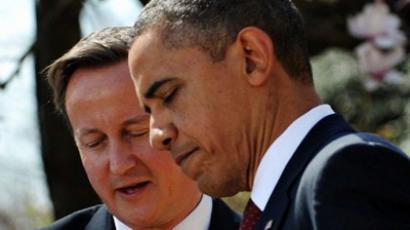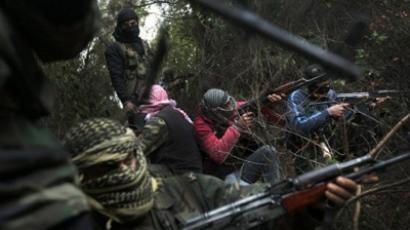Annan urges UN to unite for Syria peace
The UN-Arab League's Special Envoy to Syria urges UN Security Council to overcome a deadlock for the sake of ending violence in Syria. It comes ahead of the deployment of Kofi Annan’s technical mission to Damascus to discuss international monitoring.
Addressing a closed-door meeting of the fifteen-nation council via video link, Annan said that the stronger and more unified their message is in support of his efforts to negotiate a ceasefire, “the better chance we have of shifting the dynamics of the conflict.”Annan said he is doing his best “to try and find a peaceful solution,” and stressed that the Syrian crisis “can have serious impact for the whole region if it's not handled effectively.” He added that the Syrian response to his proposals was “disappointing” so far, UN diplomats told Reuters, but the envoy’s team is continuing talks with the Syrian government.
President Bashar Al-Assad praised Annan for his efforts and said he is willing to cooperate. He made it clear, however, that negotiations with the opposition would not be open while “armed terrorist groups were still operating in the country.”"The Syrian government is determined to protect its citizens by disarming the terrorists, and continues to search for a peaceful solution to the crisis by cooperating with Special Envoy Kofi Annan," state news agency SANA cites the government’s letter addressed to the United Nations.Annan will send a technical mission to Damascus next week to discuss the presence of international monitors in Syria. Annan’s spokesman Ahmad Fawzi explained that the mission will “discuss the modalities of a monitoring mechanism, and practical steps to implement other issues in Mr. Annan’s proposals, including an immediate cessation of the violence and the killing.”Establishing impartial monitoring mechanisms in Syria is a part of the five-point roadmap agreed upon last week in Cairo by the League of Arab Nations and the Russian Foreign Minister. It also includes an end to violence by all sides of the conflict, unhindered access to humanitarian aid for all Syrians, no external interference and support of Annan’s mission.On Friday, Russia urged the international community to assist Annan and to avoid any moves that could undermine his mission. “Every time we have a feeling that we manage to achieve some positive change in the stance of Damascus, there's an immediate counterweight reaction and any steps forward are dismissed,” Foreign Minister Sergey Lavrov said. “I hope this won't happen with the attitude of countries in the Middle East, and some Western states, to the mission of UN-Arab League envoy Kofi Annan.”He added that Russia is sending a clear message to Syria, urging all parts of the conflict to cooperate. “We equally hope that other members of the Security Council will also demand that the opposition does not provoke the escalation of violence, and cooperate with Mr. Annan's mission,” Lavrov concluded.
In the meantime, Turkish Prime Minister Recep Tayyip Erdogan said his country may consider creating special buffer zones along the border with Syria to protect refugees fleeing the fighting. “A buffer zone, a security zone, are things being studied,” Erdogan told reporters on Friday. Thousands of Syrian refugees have fled to Turkey since the start of the uprising. Turkey also hosts the Syrian National Council, recognized by the United States and a number of its allies as the legitimate representative of the Syrian people.
SNC skeptical of Annan's success
The Syrian National Council, however, has been skeptical of Annan’s mission to Syria, saying it will most probably yield little result.Secretary General Burhan Ghalioun said Annan risked wasting months in “pointless mediation efforts” and criticized the former UN chief for his insistence on a political solution to the conflict. Yaser Tabbara, an advisor to Ghalioun, noted that Annan would most probably not succeed as the Assad regime had made clear, in his opinion, that it was not interested in a political settlement.
Arab states closing embassies in Syria
On Thursday, Abdulatif al-Zayani, the Secretary General of the Gulf Cooperation Council, announced that its member countries – namely Saudi Arabia, the United Arab Emirates, Oman, Qatar, Bahrain and Kuwait – will close their embassies in Damascus.Al-Zayani said the action was a protest against the Assad government “massacring its people and rejecting all initiatives aimed at finding a solution.”The statement came after Saudi Arabia and Bahrain announced the closures of their missions in Syria.
It is now very difficult to say how far Annan will be able to get, as America, Britain and France have been very clear that they want to effectively push regime change in Syria, Spiked magazine deputy editor Rob Lyons told RT.“They are not really prepared to settle for anything less than that. And obviously the Syrian government does not want to be replaced. So there is a basic deadlock in that situation,” he said. “And Russia and China seem to be hoping for some kind of in-between solution – whether it’s monitors on the ground [or something else]. It may be a step forward but fundamentally the attitude of the major Western governments is to go much further in terms of replacing the Assad regime. I don’t see much of a compromise on that.”Lyons also pointed out that in fact the interference has already begun.“There’s an incredible amount of intervention going on in terms of sanctions, in terms of the use of bodies like the IAEA and so on. So they actually intervene in Syria already. As that continues, I think we will only tend to confirm the idea that it’s legitimate for the west to intervene in the affairs of sovereign states. From that point of view I think Moscow has got something to be worried about.”














